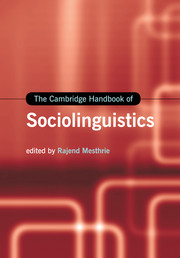Book contents
- The Cambridge Handbook of Sociolinguistics
- Series page
- The Cambridge Handbook of Sociolinguistics
- Copyright page
- Contents
- Figures
- Tables
- Contributors
- Preface and acknowledgments
- Abbreviations
- 1 Introduction: the sociolinguistic enterprise
- Part I Foundations of sociolinguistics
- Part II Interaction, style, and discourse
- Part III Social and regional dialectology
- 10 Language, social class, and status
- 11 Language and region
- 12 Language and place
- 13 Language, gender, and sexuality
- 14 Language and ethnicity
- Part IV Multilingualism and language contact
- Part V Applied sociolinguistics
- Notes
- References
- Index
12 - Language and place
from Part III - Social and regional dialectology
Published online by Cambridge University Press: 05 June 2012
- The Cambridge Handbook of Sociolinguistics
- Series page
- The Cambridge Handbook of Sociolinguistics
- Copyright page
- Contents
- Figures
- Tables
- Contributors
- Preface and acknowledgments
- Abbreviations
- 1 Introduction: the sociolinguistic enterprise
- Part I Foundations of sociolinguistics
- Part II Interaction, style, and discourse
- Part III Social and regional dialectology
- 10 Language, social class, and status
- 11 Language and region
- 12 Language and place
- 13 Language, gender, and sexuality
- 14 Language and ethnicity
- Part IV Multilingualism and language contact
- Part V Applied sociolinguistics
- Notes
- References
- Index
Summary
- Type
- Chapter
- Information
- The Cambridge Handbook of Sociolinguistics , pp. 203 - 217Publisher: Cambridge University PressPrint publication year: 2011
- 37
- Cited by

